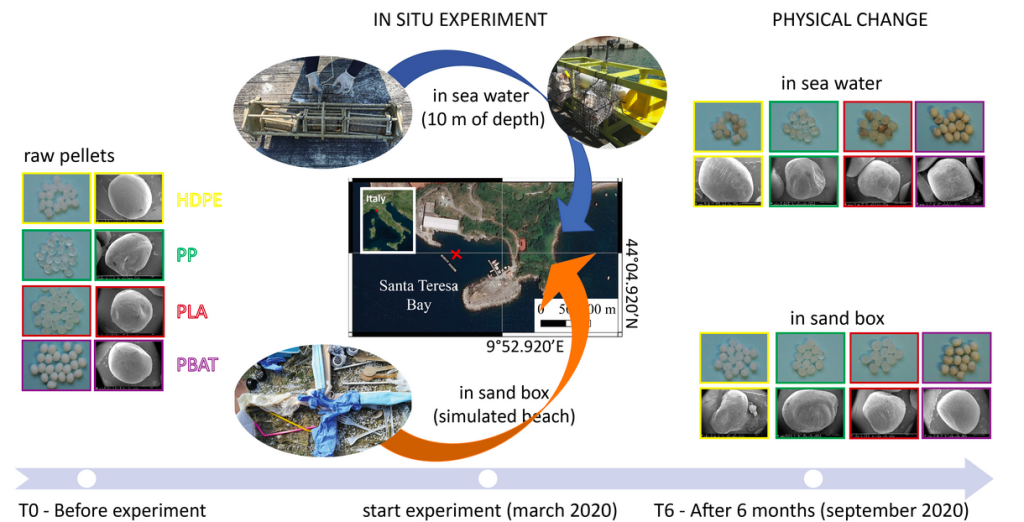Environmentally friendly bioplastics? Not really, according to a study carried out by a group of scientists from the National Research Council (CNR), National Institute of Geophysics and Volcanology (INGV) and Ligurian District of Marine Technologies, the results of which were published in the open access journal Polymers.
The study showed that, if dispersed in the environment, even bioplastics have very long degradation times, comparable to those of non-biodegradable plastics. The researchers obtained this result through an innovative experiment designed to investigate the long-term behaviour of different types of virgin plastic granules (resin pellets) found in commonly used products.
Specifically, two polymers commonly used in plastic objects (HDPE and PP) were compared with two biodegradable plastic polymers (PLA and PBAT) to study their degree of ageing and degradation in seawater and sand. In both environments, neither traditional nor biodegradable polymers showed significant degradation after six months. Observation of the samples, combined with chemical, spectroscopic and thermal analyses, performed in the laboratory of the Institute for Chemical-Physical Processes (IPCF) of the CNR led by Simona Bronco, revealed that bioplastics take a much longer time to degrade in the natural environment than under industrial composting conditions.

“Given the widespread use of these materials, it is important to be aware of the environmental risks related to bioplastic waste if dispersed or not properly disposed of. It is necessary to provide correct information,” explained Silvia Merlino, researcher at the Institute of Marine Sciences (ISMAR) of the CNR, project coordinator.
“This study highlights the importance of providing correct information on biodegradable plastic, especially after the ban on single-use plastic products that came into force in Italy in January 2021, in compliance with the EU ‘Single-Use Plastics’ Directive, which has led to the progressive commercialization of single-use biodegradable plastic products, such as the polymers examined in our study,” added Marina Locritani, INGV, study co-coordinator.
The experiment, the first of its kind to be carried out entirely in situ, made use of the “LabMARE Coastal Station”, an underwater platform located at a depth of 10 metres in Santa Teresa Bay, in the Gulf of La Spezia, built as part of the “Laboratorio Mare” project of the Ligurian District of Marine Technologies. Thanks to the support of divers from the “Centro nautico e sommozzatori” and of mussel farmers from “Cooperativa mitilicoltori spezzini” of La Spezia, special “cages” containing plastic samples were installed on the underwater platform. Also, a sandbox containing the same plastic granules was exposed to atmospheric agents to simulate the surface of a beach. The experiment, currently underway, will be completed in 2023.
The project includes other experiments to study degradation processes at higher depths to be carried out by installing other cages containing plastics and bioplastics at “Stazione profonda del LabMare”, at a depth of approximately 400 metres, again in Ligurian waters. A further study is already underway – conducted in collaboration with Istituto Zooprofilattico Sperimentale del Piemonte, Liguria e Valle d’Aosta (IZTO) – on the state of degradation of resin pellets in the sea and the presence of chemical substances (PAHs, PCBs, pesticides) absorbed by them, as well as on the processes related to the retention of contaminants by mussels, traditionally considered the “sentinels” of water pollution.

